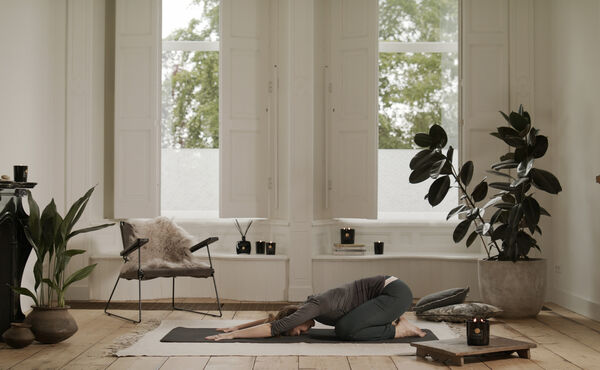Do you ever feel like you’re just not in full control of your life? Have you ever woken up feeling overly emotional or just 'stuck'? Or perhaps, there are days when you crave quiet solitude, or nights when your mind races and you just can’t switch off? Every monthly moon, and each of her phases, offers us different opportunities, challenges and lessons. Lunar Living provides an understanding of emotional impulses and clear guidance on how to use the energies of each moon phase to help you to realign everything in your own life, to understand when you need rest and self-care and when you need to shine and make things happen.
“Just as the moon turns the tides she exerts the same gravitational pull on the watery inner world of our emotions, intuition, dreams and the call of our soul,” says Kirsty Gallagher, Moon Mentor and author of Lunar Living: Working with the Magic of the Moon Cycles.
A 2013 study looked into the relationship between lunar cycles and sleep and melatonin rhythms, concluding that a full moon did indeed disrupt sleep for the volunteering subjects. Set in a tightly controlled, dark environment where volunteers could not see the moon, it took volunteers five minutes longer to nod off, they slept for 20 minutes less and spent 33% less time in a deep sleep. And to some – possibly all of us – those 20 minutes and time spent in deep sleep is crucial!
In an interview with the BBC, UK sleep expert Dr Neil Stanley dryly remarked, "There’s going to be a full moon every month whether you like it or not." So, if we can't stop it, then how are we going to work with it? And that's where Lunar Living could be the answer to your short nights and moody mornings. Living back in tune with the natural flow of lunar cycles and taking care of you and your needs will make the most significant difference to how you feel, act and react the rest of the month.
Lunar Living in practice
Think of the New Moon as the beginning of your lunar journey; a time to use the energies of the new moon to set your dreams, goals and intentions for the lunar month ahead.
As the moon waxes and grows bigger and brighter in the sky every night, use the growing energy and light of the moon to do all you can to bring your new intentions to life. As the moon’s energy grows, so will yours.

Read: Intention settings - the secret to making long-lasting changes
The Full Moon brings a moment of completion. Check in with yourself during a full moon, look back and celebrate what worked, take an honest look at what didn’t, and what you allowed to hinder your progress. When the moon grows smaller in the sky every night, use the moon’s waning energy to let go of any doubts, beliefs and fears, and anything that stood in your way.
The moon wanes all the way down to the dark moon, the lowest energy point and most emotional part of the lunar cycle. This is the time of the lunar cycle to rest, pause and take your awareness inwards. It’s essential at this part of the cycle that you take note of your emotions and what they are trying to show you, as this will help set your intentions for the next lunar month.
The moon and your sleep routines
Here are some tips for creating a routine that will give you the best chances of sleeping through the lunar cycles of the moon.
First and foremost; make sleep a priority! When you’re asleep, your body restores itself—which is why next to eating well and exercising, getting enough sleep is the most important thing you can do for your health.
1. Improve your sleep during the day
Avoid large meals too close to bedtime, but don't go to bed hungry. A small snack is okay, but don’t reach for sugary or fatty foods if you’re feeling down or low on energy. And remember that caffeine stays in the body for up to 8 hours, so you should avoid drinking it after 2 pm. If you’re craving a warm drink in the afternoon, try some herbal tea.
2. A bedtime routine
Create a calming bedtime routine, preferably one that’s in tune with your circadian rhythm to make it easier to maintain. Our biological clocks are set by the sun and the moon. As the sun goes down, the melatonin in our bodies begins to increase, preparing the body for sleep. Did you know that some sleep gurus suggest wearing sunglasses after 4 pm to increase melatonin production?
3. No screens
An hour or so before sleeping, avoid electronic devices like laptops, tablets, and smartphones. The blue light emitting from these devices throws off your circadian rhythm, making your brain think it’s daytime. Your routine should include relaxing activities, like listening to calming music, or reading in a low-lit room.
4. Be a bit shady and keep it cool
Sleep in a relaxing environment with a good bed and pillows to help improve your sleep quality. If you are kept awake or awakened by light, use blackout shades and/or eye pillows. Studies show that the optimal temperature for sleeping is around 18.5 degrees, so keeping your bedroom cool is a must. Ventilation is also beneficial – the new air circulating throughout the room promotes deeper sleep, so whenever possible, try to sleep with the window at least partially open.
5. The snooze button is not your friend
Repeat after me, ‘I will not snooze, I will not snooze’. Sleep studies have found that hitting the snooze button can not only disrupt healthy sleep patterns but may leave you feeling drowsy for the rest of the day.
Establish a sleep routine, and stick with it, even on the weekends or when the dark moon is wreaking havoc on your emotions – and do not hit that snooze button!
It’s time to let it all go, and dream.
-
Promotions
View full details€21,52 €26,90






